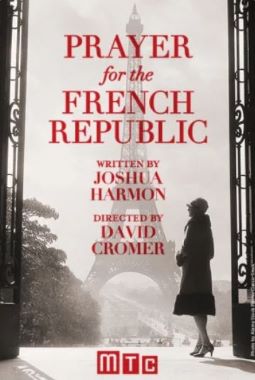“ARE WE SAFE?”
In a world that foolishly brought back authoritarian regimes and fascist rhetoric, as if they didn’t do enough damage to humanity in the past, it is always wise to keep history in mind and “never forget” the atrocities we have committed. With Prayer for the French Republic, on Broadway at the Samuel J. Friedman Theatre, Joshua Harmon planned to do just that — give us a lesson on anti-Semitism.
Anthony Edwards
The Salomon-Benhamous, an upper-middle-class French family living in Paris for more than a century, are faced with an alarming question: are we safe in our own country? They are Jewish and their son Daniel (Aria Shahghasemi) has been attacked twice for wearing a yarmulke. It’s 2016 and they still feel like a target. Harmon then shows us the lives of their great-grandparents in the 1940s as they are faced with the same question. Set designer Takeshi Kata uses a revolving stage to smoothly move between the past and the present, a small dark kitchen and a sunbathed living room.
Betsy Aidem, Molly Ranson
One by one, the characters give us all different reasons to leave or stay, showing the anti-Semitic trauma in its entirety. Marcelle Salomon Benhamou (Betsy Aidem), a psychiatrist living in Paris, is the family matriarch. At first, she begs her son to stop wearing the yarmulke or put a baseball cap over it, worried but realistic. While she grew up in a liberal Jewish family and she considers herself French, her husband Charles (Nael Nacer), a doctor who, as a child, emigrated to France from Algeria during the Algerian War, is religious and deeply afraid for the well-being of his family. He wants to move to Israel even if he has to leave a successful practice and a comfortable life in Paris. For him, “it’s the suitcase or the coffin.” Bit by bit, he convinces his wife that the danger is real and imminent.
Francis Benhamou
While their son teaches math in a Jewish school, their daughter Elodie (Francis Benhamou) spends her days in a pajama, alternating between manic political tirades and depressing cynical comments. Her favorite victim is Molly (Molly Ranson), a distant American cousin who is studying in Paris for a year. Being an American makes her the butt of many unfortunate jokes. Marcelle’s brother, Patrick (Anthony Edwards) is our narrator; an atheist, he takes us through the family history and gives us a detached commentary of what is happening on stage. France is his country and he would never leave it.
Nancy Robinette, Ari Brand
Meanwhile, at the end of WWII, Marcelle’s great-grandmother Irma (Nancy Robinette) and great-grandfather Adolphe Salomon (Daniel Oreskes) have lost all contacts with their family. They were spared by the Nazis and still live in Paris agonizing about the destiny of their children. Their son Lucien (Ari Brand) finally returns home with their grandson Pierre (Ethan Haberfield,) Marcelle’s father, both completely traumatized by their imprisonment in the Auschwitz concentration camp. Although the rest of the family was massacred, they decide to stay in Paris and continue working at their piano manufacturing business. An exquisite example of their work sits in the middle of the set, a honey colored grand piano that is, itself, a character of the play. In 2016, Pierre (Richard Masur), runs the last of the piano stores.
Molly Ranson, Nael Nacer, Aria Shahghasemi
Although the subject is extremely important, Prayer feels like a conversation we have had or heard before. Harmon rightly gives us a long list of grievances to never forget, not including necessary elements like the French proposed ban on headscarves in public to counter the yarmulke incident; the occupation of Algeria to at least partly explain the Arab-French troubles; money as the obvious reason for war atrocities; the proximity of countries that border the Mediterranean Sea, something American Jews like Mollie obviously could never feel, just to name a few details that would have made the conversation more compelling, less didactic. Harmon gives us just a list with very little drama and even Paris, as it is represented, could have been the Upper East Side of Manhattan where you can also find a decent croissant.
Molly Ranson, Francis Benhamou, Nael Nacer, Aria Shahghasemi, Betsy Aidem, Anthony Edwards
Aidem plays a wonderful matriarch; she is a successful woman, an ironic sister, a protective wife and mother, but her part gives little room to show her talent, the complexities of her character, and the reason for her final choice. Her son doesn’t want to leave Paris, her daughter is bipolar, and she does not seem to care. The same goes for all the other characters aside from the daughter, Elodie. Benhamou’s long tirades, punctuated by “this is my last, last, final point,” are extremely entertaining, she has the space to fully show her skills.
Richard Masur, Aria Shahghasemi
This Manhattan Theatre Club production, directed by David Cromer, gracefully lit by Amith Chandrashaker, should be toured all over the States because staging it in New York is preaching to the converted. It should be part of school curricula.
Nancy Robinette, Daniel Oreskes, Richard Masur, Ari Brand, Ethan Haberfield
photos © Jeremy Daniel, 2023
Prayer for the French Republic
Manhattan Theatre Club
Samuel J. Friedman Theatre, 261 West 47th Street
ends on February 18, 2024 EXTENDED to March 3, 2024
for tickets, call 212.239.6200 or visit Telecharge
